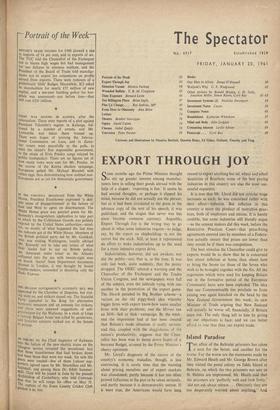EXPORT THROUGH JOY
Industrialists, however, did not awaken; nor did the public—not, that is, at the time. It was only last week, quite suddenly, that the penny dropped. The OEEC uttered a warning and the Chancellor of the Exchequer and the Trades Union Congress, and the newspapers were full of the subject, even the tabloids vying with one another in the promotion of the export game. The Sketch paraded its Big Brother scheme—a variant on the old piggy-back idea whereby bigger firms with export know-how assist smaller firms with their problems; and the Mirror ran an SOS—Sell or Sink—campaign. By the week- end the impression had at last been created that Britain's trade situation is really serious; and this, coupled with the sluggishness of the nation's productivity, suggests that the Chan- cellor has been wise to damp down hopes of a buoyant Budget, aroused by the Prime Minister's cheery optimism.
Mr. Lloyd's diagnosis of the nature of the country's economic maladies, though, is less convincing. It is surely time that the warning about pricing ourselves out of export markets was abandoned; partly because it has too often proved fallacious in the past to be taken seriously, and partly because it is demonstrably untrue. If it were true, the Americans would have long ceased to export anything but oil, wheat and select quantities of Bourbon; some of the best paying industries in this country are also the most suc- cessful exporters.
It is true that Mr. Lloyd did not criticise wage increases as such; he was concerned rather with their effect—inflation. But inflation in this country is more the product of restrictive prac- tices, both of employers and unions. It is barely credible, but some industries still blandly argue —as the cement makers did this week, before the Restrictive Practices Court—that price-fixing agreements entered into by members of a Federa- tion actually ensure that prices are lower than they would be if there was competition.
The best stimulus the Chancellor could give to exports would be to show that he is concerned less about inflation at home than about how to bring the Seven (or those of the Seven who wish to be brought) together with the Six. All the arguments which were used for keeping Britain out in the formative period of the European Community have now been exploded. The idea that our Commonwealth ties preclude us from joining was again knocked on the head by the New Zealand Government this week; its new Minister of Trade arguing that New Zealand will actually be worse off, financially, if Britain stays out. The only thing left to lose by giving up our objections is face; and we can better afford to lose that than our export trade.


































 Previous page
Previous page